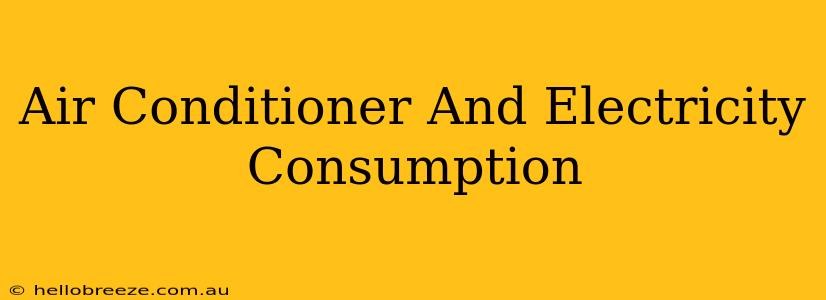Summer's heat can be unbearable, making air conditioners essential for comfort. However, the high electricity consumption of AC units is a significant concern for homeowners. This guide explores the relationship between air conditioners and electricity use, offering tips to minimize your energy consumption and save money.
Understanding Air Conditioner Energy Consumption
Air conditioners work by removing heat from your home and releasing it outside. This process requires significant energy, making them one of the most electricity-hungry appliances in your house. The amount of electricity an AC unit consumes depends on several factors:
Factors Affecting AC Electricity Consumption:
-
Size: An air conditioner that's too small for your space will work harder and consume more energy trying to cool the area. Conversely, an oversized unit might cycle on and off frequently, also wasting energy. Proper sizing is crucial for efficiency.
-
SEER Rating: The Seasonal Energy Efficiency Ratio (SEER) measures an air conditioner's efficiency. Higher SEER ratings (15 or higher is generally considered efficient) indicate lower energy consumption for the same cooling power. Look for high SEER ratings when purchasing a new unit.
-
Age: Older air conditioners are typically less energy-efficient than newer models. If your AC is more than 10 years old, upgrading might significantly reduce your electricity bill.
-
Maintenance: Regular maintenance, including filter cleaning and coil cleaning, is vital for optimal performance and energy efficiency. A clogged filter restricts airflow, forcing the unit to work harder.
-
Usage: How often and how long you run your AC directly impacts your electricity usage. Strategic use, such as using it only when necessary or setting it a few degrees higher, can make a big difference.
-
Insulation and Sealing: Poorly insulated homes lose cool air more quickly, forcing your air conditioner to work harder to maintain the desired temperature. Proper insulation and sealing of windows and doors are essential for energy efficiency.
Tips for Reducing Air Conditioner Electricity Consumption
Several practical steps can significantly reduce your air conditioner's energy consumption and lower your electricity bills:
Energy-Saving Strategies:
-
Programmable Thermostat: Invest in a programmable or smart thermostat to automate temperature adjustments. You can schedule cooler temperatures only when you're home and awake, saving energy when you're asleep or away.
-
Ceiling Fans: Use ceiling fans in conjunction with your air conditioner. Fans circulate cool air, allowing you to raise the thermostat setting without sacrificing comfort.
-
Shade Your Home: Reduce the amount of heat entering your home by using curtains, blinds, or awnings to block direct sunlight during the hottest parts of the day.
-
Seal Windows and Doors: Caulk and weatherstrip any gaps or cracks around windows and doors to prevent air leaks. This helps maintain a consistent temperature inside and reduces strain on your AC.
-
Regular Maintenance: Clean or replace air filters regularly, and schedule annual professional maintenance for your air conditioning unit. This ensures it runs at peak efficiency.
-
Consider a Heat Pump: Heat pumps offer high energy efficiency for both heating and cooling. If your climate allows, a heat pump could be a cost-effective long-term solution.
Choosing an Energy-Efficient Air Conditioner
When purchasing a new air conditioner, prioritize energy efficiency. Look for units with high SEER ratings and Energy Star certification. Consult with a qualified HVAC professional to determine the appropriate size for your space. Investing in a high-efficiency unit will pay for itself over time through lower energy bills.
By following these tips, you can significantly reduce your air conditioner's electricity consumption and contribute to a more sustainable and cost-effective lifestyle. Remember that energy efficiency is a long-term investment that benefits both your wallet and the environment.

